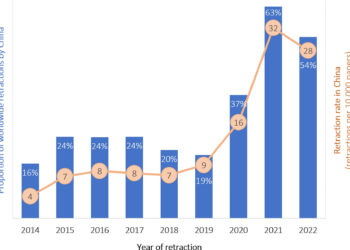Every day just after the clock strikes 4pm, the administrators of the arXiv at Cornell University routinely witness something curious — a flurry of eprint submissions. It is no secret that 4pm marks the submission deadline for email announcement lists that go out to readers. Authors submitting as close after the 4pm mark can be guaranteed high placement in the list: Submit right before 4pm and you’re guaranteed to be last.
Does anyone really care about where you make the list? After all, readership is supposed to be based on merit and not on things like placement criteria. According to a paper published earlier this year [1] by German physicist, Jörg Dietrich, position does matter. In fact, articles submitted close to the top of astro-ph mailings tend to receive twice as many citations on average as those articles appearing lower on the list. He posits three explanations for this pattern:
- Visibility Bias — articles appearing closer to the top of the list receive more attention, and thus more citations, than articles lower on the list.
- Self-Promotion Bias — authors are savy about promoting their best papers in highly-visible places.
- Geography Bias — the 4pm deadline is biased toward scientists working in North America and against those working in far eastern countries.
Dietrich ruled out Geographic Bias as a plausible explanation, leaving him to attempt to disentange Visibility from Self-Promotional bias.
In his latest paper, Disentangling visibility and self-promotion bias in the arXiv, [2] Dietrich attempts to disambiguate the effect of position from the effect of self-promotion. By using the submission times to divide their sample into two groups: papers submitted within 5 minutes after 4pm (the self-promotion group), and papers submitted at least an hour and a half later, he reports:
We found that the sample of self-promoted papers indeed has the highest citation rates. This shows that self-promotion as a mechanism that preferentially puts intrinsically more citable papers to the top of the astro-ph listings in fact works.
In addition, Dietrich finds support for an independent ordering effect, decreasing the number of expected citations as one moves down the publication list.
Its an interesting paper indeed, and has its theoretical explanation in attention economics. Physicists, like everyone else, look to the order of one’s paper as a heuristic for deciding what to read. This is no different than using other tools, like citations or references as tools to guide a scientists to what is important.
Dietrich suggests that a simple solution to the Visibility Bias would be to randomize the order of submissions on the publication listing. On the other hand, physicists have come to use list order as a reading tool. The number of manuscripts submitted during the first 60 seconds nearly doubled during his sample period, underscoring that authors intrinsically understand the importance of being first.
Coming up with a solution that both helps to guide readers but also creates a fair playing field for authors is the logical next step.
Notes:
[1] Dietrich, J.P. The Importance of Being First: Position Dependent Citation Rates on arXiv:astro-ph. Publications of the Astronomical Society of the Pacific 2008;120:224-228. DOI:10.1086/527522
[2] JDietrich, J.P. Disentangling Visibility and Self-Promotion Bias in the arXiv:astro-ph Positional Citation Effect. Publications of the Astronomical Society of the Pacific, 2008;120:801–804, 5 June 2008, DOI: 10.1086/589836
Discussion
2 Thoughts on "The Importance of Being First"



